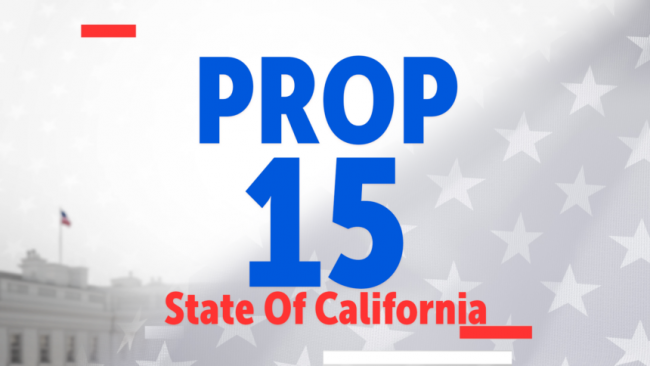California voters have rejected Proposition 15, a ballot measure that sought to make the biggest change to California property tax law in decades in order to raise money for local governments and education.
The Associated Press said the measure had been defeated as vote-counting showed it failing, 52% to 48%.
Proposition 15 would have altered property tax law enacted in 1978, when voters approved Proposition 13. The anti-tax measure set all property taxes in the state based on purchase price.
California voters have rejected Proposition 15, a ballot measure that sought to make the biggest change to California property tax law in decades in order to raise money for local governments and education.
The Associated Press said the measure had been defeated as vote-counting showed it failing, 52% to 48%.
Proposition 15 would have altered property tax law enacted in 1978, when voters approved Proposition 13. The anti-tax measure set all property taxes in the state based on purchase price.
It was expected to bring in between $8 billion and $12.5 billion in additional tax revenue by 2025, according to the nonpartisan Legislative Analyst’s Office. Currently, property taxes bring in about $65 billion per year. Most of the money would have gone to schools and local governments.
The measure was one of the most closely watched contests on California ballots. The race attracted more than $130 million in spending. On the supporting side, the California Teachers Association and Service Employees International Union were the biggest contributors. Real estate companies including Blackstone were the largest donors to the opposition.
Joe Biden, Kamala Harris and Gov. Gavin Newsom all backed the measure. Many business groups and the California Farm Bureau fiercely opposed it.
The measure exempted residential property and farmland. It also delayed implementation for buildings that primarily rent their space to small businesses.
Opponents of the measure argued that small businesses that rent their spaces would be hit hard by the reassessments because the increased costs would be passed to them through their lease agreements.
Supporters argued that many small businesses would actually see an overall tax cut because of a provision that exempted their business equipment from taxes.
Although the measure does not affect residential property, opponents had targeted homeowners with their message about protecting California’s 1978 measure.
“From day one, we knew that if voters understood the harm this deeply flawed tax hike would impose on California’s economy and its families, farmers and small businesses, voters would reject this ill-advised effort,” Rob Lapsley, president of the California Business Roundtable and co-chair of the No on Prop 15 campaign, said in a written statement. “Today’s victory should send a clear message to the proponents and warn all politicians that voters will continue to reject attempts to dismantle Prop 13.”
Supporters, on the other hand, pointed to the measure’s narrow defeat as evidence of an appetite for reforming the tax code.
“California’s challenges are not going anywhere, and this election result has shown that there is strong public demand for closing the corporate tax loopholes which cost our local communities billions every year,” Proposition 15 campaign spokesman Alex Stack said in a written statement.

